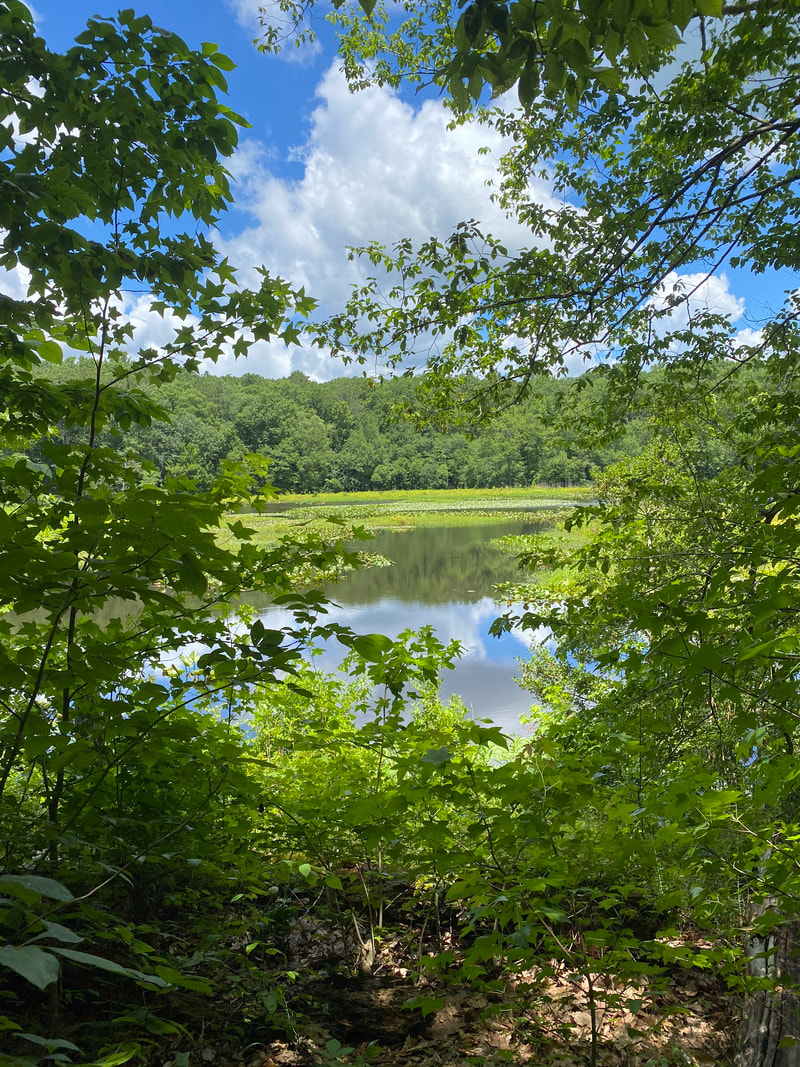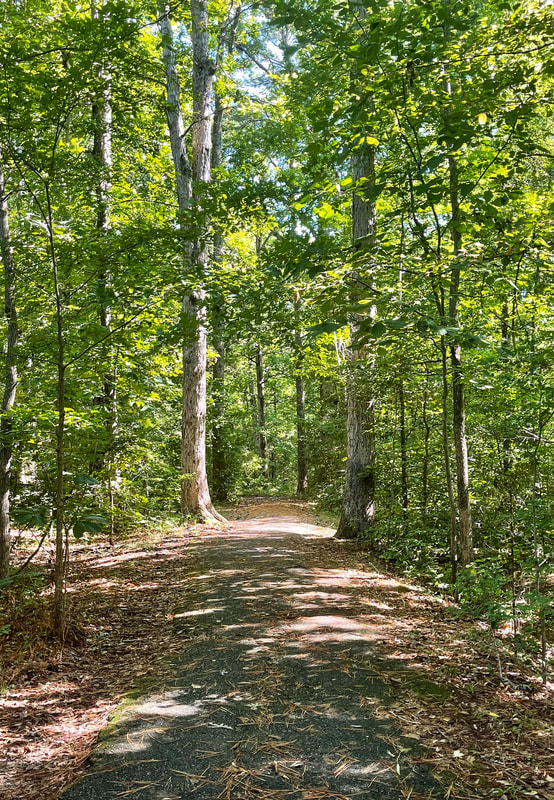|
When I have the opportunity to be outside, I take it. Even if it is starting my morning on the deck with coffee, going for a walk in the neighborhood, or strolling in a local park for a short time. There is something about the color, the smell, and the sounds that is so soothing. I have always wondered if it was my personality that pulled me to nature, or something else. It turns out, I am not the only one who wondered about this.
I recently ran across an article that talked about the science of "your brain on nature." This article inspired me to look at the writings and research behind this idea. Looking back a few hundred years, there are writings that support the belief that nature is good for us. One of the US's most influential landscape designers, Frederick Law Olmsted (who designed Central Park, as well as many others) was significantly influenced by a book written in 1807, by a physician named Johann Georg von Zimmermann. In that book, von Zimmermann talked about and explored how nature could "heal derangements of the mind." (1). Olmsted later adopted this thinking, and even argued to the California government that Yosemite Valley should be protected because "It is a scientific fact that the occasional contemplation of natural scenes of an impressive character ... is favorable to the health and vigor of men and especially to the health and vigor of their intellect.”(2). To return to the recent article I read, the scientific studies do, in fact, substantiate what von Zimmermann wrote in 1807 and Olmsted argued in 1868. It considered studies from the last 10-15 years that focused on how nature (or green areas, as they are known in larger cities) affect our biology. In study after study, the answer is that nature affects our biology in a very positive way. For me, the most notable studies mentioned in the article were Dutch, English, and Canadian studies that measured physical health (by identifying a number of common health issues, like heart disease and diabetes), and compared it to the amount of green space or natural area of the surrounding neighborhoods. These studies controlled for factors such as physical activity and socioeconomic status. Each of these large scale studies found that there were less health issues in neighborhoods with more nature. (3) These studies were so remarkable to me because they took out all factors except exposure to nature, and consistently found positive health effects. From there, I did a search for the effects of nature on our mental health. National Institute of health reviewed studies from the last 15 years that looked at this very idea- and study after study found either physiological or subjective evidence that being in nature improved mental health. (4). This means that some studies actually found reductions in cortisol levels (a biological marker of stress) and/or participants reported feeling better. What I have concluded from this brief study review, inspired by the article, is this- that my morning coffee on the deck is actually restorative, both physically and mentally. For you, the take away is this- nature is a tool or coping mechanism that you can start using right now to feel better- both physically and emotionally. If you are up for it, take a walk outside. If that is too much, find a quiet place with trees or other greenery and sit for awhile. Feeling better isn't about finding one thing to help, it is about developing a tool box of techniques, and nature (in some form) is easily accessed and something you can add right now. If you want to explore other tools, please don't hesitate to contact me. In the meantime, I am going to step outside and give myself a little nature boost. 1. https://www.nps.gov/frla/learn/historyculture/flo.htm 2. https://www.nps.gov/parkhistory/online_books/anps/anps_1b.htm 3. https://www.nationalgeographic.com/magazine/article/call-to-wild 4. https://www.ncbi.nlm.nih.gov/pmc/articles/PMC8125471/
0 Comments
When you look at the image above, how does it make you feel and what do you think? Are you filled with calm feelings and thoughts of being surrounded by soothing nature? Or are you filled with feelings of fear, and thoughts of danger and isolation? The picture is the same, but the reaction for each person may be different. Why is that? A person's reaction is influenced by their perspective.
Our perspective is shaped by a number of factors: our past experiences, the influence of important people in our lives, societal factors, and many others. Most of us go through our days with the belief that the way we experience events contains just the facts. We forget that we are taking the facts and filtering them through our own perspective. Therefore "the facts" will become our version of the facts. Sometimes, our version may be very close to the true version, but sometimes it can be very different. Why is it important to recognize this? Because the way we perceive things will influence our thoughts, feelings, and ultimately our behavior. To use the image above as an example, if it weren't a picture but a real life situation, you would take in the information (facts) and overlay your perspective. The "facts" are that it is a path in the woods, with no other people currently present. If you generally had a positive perspective about nature, solitude, and physical activity- what choice are you likely to make? And if you had a negative perspective on those same concepts, what choice would you make? Your perspective takes the set of facts, and changes what they mean to you. This filter changes what you think, how you feel, and what you do. If we broaden this idea, and think about day to day events, how might your perspective be changing things? How does it change how you interact with others? What choices do you make because of it? And what do you expect in situations because of it? To come back to the example of the path, if I am thinking it will be a positive experience, my mind will be set to receive information that supports my expectations. That means my perspective and expectations can influence what type of experience I have! Of course, it can't guarantee that it will be a positive experience, but it definitely makes it more likely. But what if your perspective is negative? What if the path above represents danger and scary things? And more broadly, what if you believe that people are generally bad and will take advantage of you? How is this perspective impacting your decisions? For those who are experiencing depression and anxiety, how is that changing your perspective and expectations? While reading this, if you found yourself identifying more negative perspectives, and recognized how it leads to negative expectations, what can you do to change this? The not so helpful answer is "change your perspective!" That's like telling an anxious person not to worry... The answer may not be helpful, but it is accurate. The issue is that you need to know how to make it happen! As I say to clients- the first step is awareness. Make an effort to test yourself to see if there is a particular perspective that is shaping your experience of events. Sometimes you can identify this by asking how someone else might see it- perhaps a friend or a family member. That shift in thinking can offer an opportunity in the moment to look at the situation differently. If that is not an option, you can take a moment to find the "facts." Think about the actual event, being careful to strip away the judgement and interpretation. For example, think of the "facts" about the image at the beginning of this post and how it only considers what can be seen and can't be argued. The next step is to make an effort to challenge your perspective and attempt to find an alternative. Ask yourself how this new alternative will change your response. Will it be in a way that is likely to lead to you being happier, more comfortable? Also, how does holding on to the old perspective benefit you? And lastly, use each of these new experiences to reshape your perspective in a way that aligns with what makes you happy! Reshaping your perspective involves developing self-talk that represents the new perspective. This is not an easy process, and can take time and practice. But if the end result is experiencing life in a way that leads to happiness, calm, and contentment, doesn't it seem worth it? If it feels overwhelming to do this on your own, feel free to reach out to me. I'm happy to work with you on this. And let me know what you think by leaving a comment below. I would love to hear some of your own experiences with perspective and expectations! |
AuthorI am a therapist- helping people to overcome difficulties and improve their lives. Archives
September 2022
Categories |
Site Links |
| ||||||||||||||
Site powered by Weebly. Managed by FreeLogoServices.com



 RSS Feed
RSS Feed
